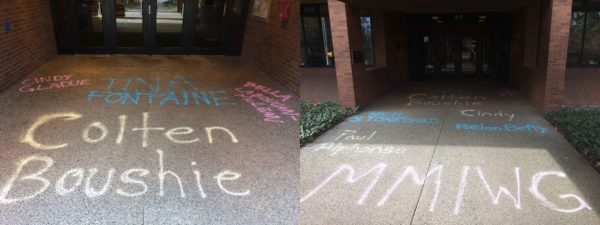
Spray-painted signs adorn the concrete outside the Faculty of Law building and the Fraser building. Photos by Josh Kozelj, Staff Writer
Seven months after UVic announced a new law program combining the study of Indigenous and non-Indigenous legal practices, the university has officially kickstarted the world’s first Indigenous Law degree this month.
“When it’s fully up and running, there will be 100 students in the program,” said Law Communications Officer Julie Sloan. “We’re actually over-subscribed this year, it’s supposed to be 25 [students] but we took 26.”
Dr. Val Napoleon is the Director of the Indigenous Law Research Unit (ILRU) and Chair of Aboriginal Justice and Governance. She has been credited as the driving force behind the program, and is excited about the opportunity that students now have to receive two separate degrees, in Canadian common law and Indigenous law.
“What is new here is the recognition of Indigenous law as law, to be treated rigorously and comprehensively and formally taught,” Napoleon told CBC Radio in March. “This is the first dual-degree program where over a four-year period, students will receive an Indigenous law degree and Canadian law degree.”
Napoleon’s work in raising awareness of Indigenous law has garnered the attention of scholars from countries around the world, including the Centre for Advanced Study at the Norwegian Academy for Science and Letters in Oslo, Norway.
Napoleon, accompanied by UVic professor of Law Rebecca Johnson, helped lead a one-week workshop in Oslo for postdoctoral students and scholars about the legal processes in Indigenous communities.
The degree was announced in the wake of recent verdicts that acquitted white males of the murders of Indigenous teenagers Tina Fontaine and Colten Boushie.
The duo explained to the students — who came to the Oslo summit from Brazil, Italy, and Canada — that the ILRU works with Indigenous communities to learn about their traditional ceremonies, stories, artifacts, and songs, in order to foster strong relationships with Indigenous peoples who’ve felt they’ve been mistreated by the law in the past.
John Borrows, a UVic Indigenous law professor who helped Napoleon conceive the new program, identifies the difference between common and Indigenous law.
While common law uses precedent from old cases to make verdicts, Indigenous law looks to nature and the land to provide law, order, and peace between people, says Borrows.
The degree was announced in the wake of recent verdicts that acquitted white males of the murders of Indigenous teenagers Tina Fontaine and Colten Boushie. The events sparked outrage and protests across the country earlier this year.
Thousands of people gathered in Toronto in a call for justice for Fontaine, hundreds rallied in Saskatoon in defiance of the not-guilty verdict in Boushie’s case, and UVic law students organized a rally around Ring Road to show solidarity with protesters across the country.
Students in the four-year program will graduate with both a Juris Doctor (JD) and Juris Indigenarum Doctor (JID) degree.
In terms of what this program means for Canada, Napoleon said to CBC that “this is the very first law degree of its kind, and it is going to be a vital part of rebuilding Indigenous law to meet today’s challenges.”
The Law department is hosting an event later this month to officially kick off the ground-breaking program. On Sep. 25, the new program will be launched by Songhees Nation Elder Dr. Skip Dick; Minister of Advanced Education, Skills & Training, the Honorable Melanie Mark; and UVic President Jamie Cassels — followed by a feast with the first year student cohort.
“We’ve got Supreme Court judges, we’ve got federal and provincial ministers . . . First Nations chiefs from across the country all coming,” said Sloan.
In the evening, students are invited to a public lecture with Napoleon and Burrows to talk about Indigenous law.
Students in the four-year program will graduate with both a Juris Doctor (JD) and Juris Indigenarum Doctor (JID) degree, the ability to practise Canadian common law, and the information to act in Indigenous legal matters.
The program’s launch and celebratory feast will be held at the UVic First Peoples House Ceremonial Hall on Sept. 25 at 10:30 a.m. The lecture will begin at 7:30 p.m. in the University Centre’s Farquhar Auditorium.







